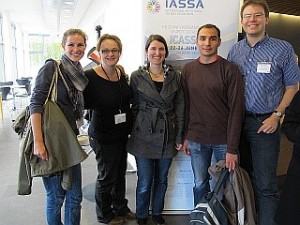Call for Papers: Facing the Monstrous North
ICASS VIII, Prince George, British Columbia, Canada
May 22 – 26, 2014
We invite contributions for a panel at the Eighth International Congress of Arctic Social Sciences (ICASS VIII), taking place at the University of Northern British Columbia, Prince George, British Columbia, Canada on May 22 – 26, 2014. The session “Facing the Monstrous North” follows up on its predecessor, “Imagining the Supernatural North”, held at ICASS VII in 2011. In this panel, twenty scholars examined the cultural construction of the North as an area of the supernatural, with examples and case studies ranging from ancient Greek cosmology to present-day fantasy literature. A proceedings volume based on the panel will be published in 2014.
Following on from the success of this panel, we now want to focus on a particular aspect of the supernatural North: the role of monstrosity in the construction and perception of Northernness. In different cultural contexts and discourses, the forbidding and threatening aspects of the North were embodied by monstrous beings, the giants of Old Norse mythology and the Wendigo of the Algonquian tradition being just two examples. Yet the North was not only believed to be inhabited by monsters, it was also perceived as having the ability to draw out the most monstrous and debased aspects of human nature, as the discussions of Northern diabolism in the 16th century and the morbid fascination with Northern cannibalism in the 19th century have shown.
However, a scholarly discussion of the monstrous North should not be restricted to a mere juxtaposition of grotesque beings and practices. Evidenced by its etymology, a monstrum is a signifier (Latin monere, “to warn”; monstrare, “to show”), and the septentrional monsters signify and express human attitudes to the North. As such, an in-depth study of the Monstrous North would be an important contribution to the on-going discussion on perceptions of Northernness in the humanities and social sciences.
The panel intends to examine a variety of approaches to monstrosity, and contributions from different methodological angles and different disciplines (cultural and social anthropology, history, theology, literary studies, biology, psychology, gender studies etc.) are very welcome. Possible topics include, but are not limited to:
– Northern Cynocephali, Skiapodes and other wondrous races of the Greco-Roman canon
– Giants, trolls and their kin—Northern monsters in European mythology and folklore
– Wendigo, Wechuge and the monstrous North in Native American tradition
– Monstrous bodies and monstrous behavior—corporeality and deviance
– Anthropophagy in the North
– Northern witches as an embodiment of monstrous femininity
– Biological deviance in scientific (and pseudo-scientific) studies of Northern fauna and people
– Frankenstein’s Monster and the monstrous North in European literature
– The monstrous North in modern popular culture
Please submit your paper proposals using the ICASS VIII submission form (http://resweb.res.unbc.ca/icass2014/ICASSVIII_Abstract_submittal_form_pdf_final.pdf) and indicate that you intend to contribute to the session on “Facing the Monstrous North”. Completed forms should be sent to IASSA Secretary, Cher Mazo (mazo@unbc.ca), with a copy mailed to stefan.donecker@eui.eu. The deadline for application is December 17, 2013.
You can find additional information on ICASS VIII at the conference website http://resweb.res.unbc.ca/icass2014/index.htm. Students, early career researchers, indigenous participants, and participants from Russia and other countries who have limited means to attend may apply for travel funding. Please refer to the conference website for details.
For further questions, don’t hesitate to contact us!
Best regards,
Eleanor Rosamund Barraclough (University of Oxford)
eleanor.rosamund@gmail.com
Danielle Cudmore (Cornell University)
dmc282@cornell.edu
Stefan Donecker (Working Group Arctic and Subarctic, Vienna)
stefan.donecker@eui.eu



